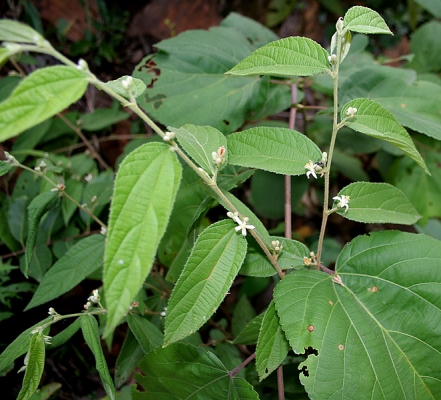Grewia hirsuta
Vahl
Malvaceae
Grewia montana J.Koenig ex Wight & Arn.
Grewia obliqua Juss.
Grewia pilosa Roxb.
Grewia roxburghii G.Don
Grewia tomentosa Roxb. ex Wight & Arn.
Grewia trichodes Voigt
Common Name:

Flowering stems
Photograph by: J.M.Garg
GNU Free Documentation License

Flowering stems
Photograph by: J.M.Garg
GNU Free Documentation License

Close-up of the flower
Photograph by: J.M.Garg
GNU Free Documentation License
General Information
Grewia hirsuta is a deciduous shrub or a small tree that can grow up to 5 metres tall[
942- Title
- Thai Forest Bulletin (Botany) No. 16
- Publication
-
- Author
-
- Publisher
- The Forest Herbarium; Bangkok.
- Year
- 1986
- ISBN
- 0495-3843
- Description
- A botanical journal, publishing papers on taxonomy (especially vascular plants), nomenclature, phylogeny, systematics, plant geography, and floristics; also morphology, palynology, cytotaxonomy, chemotaxonomy, anatomy and other relevant disciplines.
].
The plant is obtained from the wild for local use as a medicine and source of fibre.
Known Hazards
None known
Botanical References
942- Title
- Thai Forest Bulletin (Botany) No. 16
- Publication
-
- Author
-
- Publisher
- The Forest Herbarium; Bangkok.
- Year
- 1986
- ISBN
- 0495-3843
- Description
- A botanical journal, publishing papers on taxonomy (especially vascular plants), nomenclature, phylogeny, systematics, plant geography, and floristics; also morphology, palynology, cytotaxonomy, chemotaxonomy, anatomy and other relevant disciplines.
Range
E. Asia - India, Sri Lanka, Myanmar, Thailand, Laos, Vietnam.
Habitat
Mixed deciduous, and dry evergreen forests; often occurring on limestone; at elevations from 200 - 1,500 metres[
942- Title
- Thai Forest Bulletin (Botany) No. 16
- Publication
-
- Author
-
- Publisher
- The Forest Herbarium; Bangkok.
- Year
- 1986
- ISBN
- 0495-3843
- Description
- A botanical journal, publishing papers on taxonomy (especially vascular plants), nomenclature, phylogeny, systematics, plant geography, and floristics; also morphology, palynology, cytotaxonomy, chemotaxonomy, anatomy and other relevant disciplines.
].
Properties
| Medicinal Rating |      |
| Other Uses Rating |      |
| Habit | Deciduous Shrub |
| Height | 3.50 m |
| Cultivation Status | Wild |
Cultivation Details
Not known
Edible Uses
None known
Medicinal
Grewia species are valued in many cultures for their medicinal virtues. The main medicinal action appears to come from the mucilage that is found in the leaves, stems and roots, which has been shown to have soothing and healing properties. Taken internally it is often used as a remedy for diarrhoea and dysentery, for example, whilst externally it is applied to wounds, cuts, ulcers, irritations etc. The plant can be taken as a simple infusion or decoction, or it can be applied topically as a poultice of the plant, or the mucilage can be extracted from the plant, if required, by maceration and then decoction.
.
Various parts of the plant are used in the treatment of headaches, eye complaints, sores and cholera[
1731- Title
- Phytochemical and Pharmacological Properties of the Genus Grewia; A Review
- Publication
- Int J Pharm Pharm Sci, Vol 4, Suppl 4, 72-78; 2012
- Author
- Goyal P.K.
- Publisher
-
- Year
- 2012
- ISBN
- 0975-1491
- Description
-
].
An ethanolic extract of stem bark exhibited antiviral and diuretic activity[
1731- Title
- Phytochemical and Pharmacological Properties of the Genus Grewia; A Review
- Publication
- Int J Pharm Pharm Sci, Vol 4, Suppl 4, 72-78; 2012
- Author
- Goyal P.K.
- Publisher
-
- Year
- 2012
- ISBN
- 0975-1491
- Description
-
].
The leaves are useful in the treatment of nose and eye diseases, splenic enlargement, piles, rheumatism and for relieving joint pain[
1731- Title
- Phytochemical and Pharmacological Properties of the Genus Grewia; A Review
- Publication
- Int J Pharm Pharm Sci, Vol 4, Suppl 4, 72-78; 2012
- Author
- Goyal P.K.
- Publisher
-
- Year
- 2012
- ISBN
- 0975-1491
- Description
-
].
The roots are used in the treatment of diarrhoea, dysentery and as a dressing for wounds[
1731- Title
- Phytochemical and Pharmacological Properties of the Genus Grewia; A Review
- Publication
- Int J Pharm Pharm Sci, Vol 4, Suppl 4, 72-78; 2012
- Author
- Goyal P.K.
- Publisher
-
- Year
- 2012
- ISBN
- 0975-1491
- Description
-
].
Other Uses
A good quality fibre is obtained from the bark. It is used for making ropes[
942- Title
- Thai Forest Bulletin (Botany) No. 16
- Publication
-
- Author
-
- Publisher
- The Forest Herbarium; Bangkok.
- Year
- 1986
- ISBN
- 0495-3843
- Description
- A botanical journal, publishing papers on taxonomy (especially vascular plants), nomenclature, phylogeny, systematics, plant geography, and floristics; also morphology, palynology, cytotaxonomy, chemotaxonomy, anatomy and other relevant disciplines.
].
Propagation
Seed - we have no specific information for this species but seed of this genus is generally best sown as soon as it is ripe. Stored seed has a hard seedcoat and may benefit from scarification before sowing in order to speed up and improve germination. This can usually be done by pouring a small amount of nearly boiling water on the seeds (being careful not to cook them!), allowing the mix to cool somewhat and then leaving it in a warm place to soak for 12 - 24 hours. Sow the seeds in situ or in a nursery seedbed or trays - do not allow the compost to become dry. Germination and early growth are usually quite quick.
Cuttings - best taken with a heel.
If you have any useful information about this plant, please leave a comment. Comments have to be approved before they are shown here.
 Useful Tropical Plants Database 2014 by
Ken Fern,
web interface by
Ajna Fern
with help from
Richard Morris.
Useful Tropical Plants Database 2014 by
Ken Fern,
web interface by
Ajna Fern
with help from
Richard Morris.